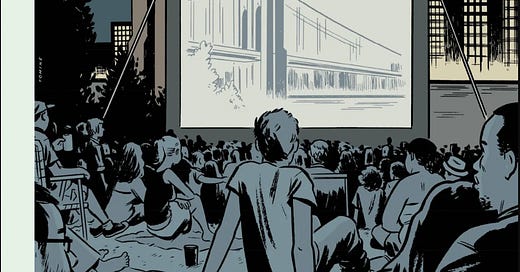On December 2, 2021, New Yorker film critic Richard Brody published his assessment of the best movies of the year with The French Dispatch at the top of the list:
Wes Anderson’s wildly comedic, yet fiercely serious, adaptation of stories and personalities from the classic age of The New Yorker unleashes a self-surpassing torrent of dramatic and decorative complexity, philosophical power, and physical intensity. It’s an extraordinary film of the life of the mind-body connection, of history in the present tense.
Brody is an eloquent advocate on behalf of The French Dispatch but his ranking elicited much mirth on twitter. The French Dispatch is a movie that presents a highly idealized picture of the golden age of The New Yorker under editors Harold Ross and William Shawn (a period which ran from 1925 to 1987). Brody, who has written for The New Yorker since 1999, giving such high marks to the movie seemed to many like a case of mutual back-scratching if not incest:





I myself enjoyed The French Dispatch but the way it relied on the myth of The New Yorker bothers some people, notably my friend Jessica Johnson, who as editor of The Walrus knows what it is to run a general interest publication. Jessica thinks The New Yorker myth spreads a false and unhealthy idea of what life in journalism is like, which hampers grappling with the real difficulties of keeping long form magazine writing going.
Jessica and I talked about both The French Dispatch and the history of The New Yorker. In our conversation, we discuss or allude to many of the books about the magazine, notably James Thurber’s The Years With Ross (1959), Brendan Gill’s Here At the New Yorker (1975), Lillian Ross’s Here But Not Here (1998), and Janet Groth’s The Receptionist (2012).
One work that is quoted a few times in the podcast is James Wolcott’s essay “The Love Bug” from Vanity Fair (July 1998). Wolcott’s wonderful survey of New Yorker history can be found online and in his omnium gatherum, Critical Mass (2013).
Here are a few passages from Wolcott that are quoted in the podcast:
[William Shawn’s] desk was an altar where the ideals of accuracy, clarity, and understated elegance were held sacrosanct. Every article, no matter how ephemeral, was groomed like a French poodle. This ultra-finesse often resulted in preciousness (sentences neatly buttoned, facts lined up like little gentlemen), and The New Yorker, inhabiting a parallel universe of scrubbed perfection, could look quaint.
The New Yorker formalized its editorial procedures and became a self-producing machine. Its multilayered editing (galleys upon galleys annotated with marginal comments), its fact¬ checking department, its scrupulous attention to grammar and usage, its extreme courtesy to its contributors, its fastidious distaste for slang and coarse language, its refusal to chase fashion, pursue celebrity, or simplify complex subjects — all this made The New Yorker the weekly chalice of sweet reason. To some, this distillation tasted of formaldehyde. In the early sixties, Seymour Krim consigned the magazine to squaresville — “the diehard editorial neoclassicists, the punctuation castratos who have gone to bed with commas for a quarter of a century, are living in a world that no longer exists.”
Not only did he strenuously fight a union movement at The New Yorker (ironic, given the magazine’s New Deal liberalism in all other regards), but, as Gigi Mahon reports in The Last Days of The New Yorker (McGraw-Hill, 1988), he shafted the top echelon in the editorial department by unilaterally denying “key” writers and editors access to stock grants, insisting that everyone at The New Yorker was equal. Shawn refused even to discuss stock options with his subordinates. He decided for them that they didn’t deserve a bonus. The New Yorker was a patriarchy, and father knew best. So when the magazine’s stock was later sold and the proceeds distributed, the business side enjoyed a windfall and the editorial side got nothing.
In our talk, Jessica and I try to balance our respect for the magazine and Anderson’s movie with a consideration of the actual history that gets glamorized.
(Podcast produced by Julia Elinore Peterson; post edited by Emily M. Keeler)
Share and Subscribe
If you like this post, please share:
Or subscribe:















Share this post